Politics
Lindell Smith
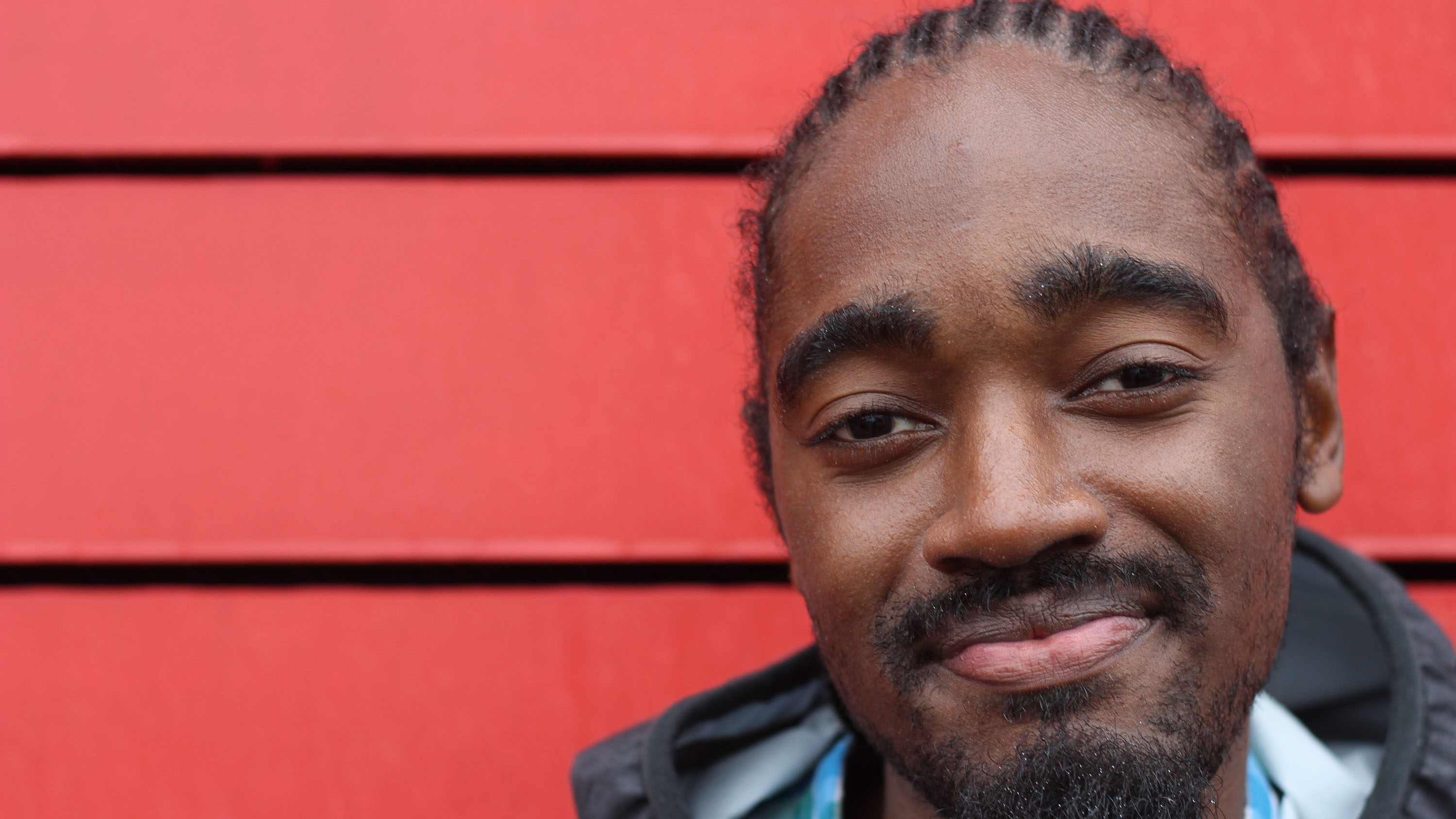
caption
The inside story of how he took Halifax Peninsula North in a landslide
At this moment, Lindell Smith is not the prototypical politician.
His tall and lanky frame isn’t clad in a suit and he doesn’t address the crowd from a lectern. He wears a green, button-down shirt and his hair is braided into tight cornrows. He climbs on top of a table at the back of Alteregos, a cafe on Gottingen Street, to address the crowd.
The packed room of supporters in the cafe falls quiet as he speaks to what they have accomplished — electing the first African-Nova Scotian to Halifax regional council in 16 years.
“Just take a moment and look around this room,” Smith says, his arms spread wide. “There’s not one person that’s the same. This campaign, it’s something that’s never been done in this city. We showed that if we all work together — no matter our backgrounds, no matter our gender, no matter where we come from — we can do it.”
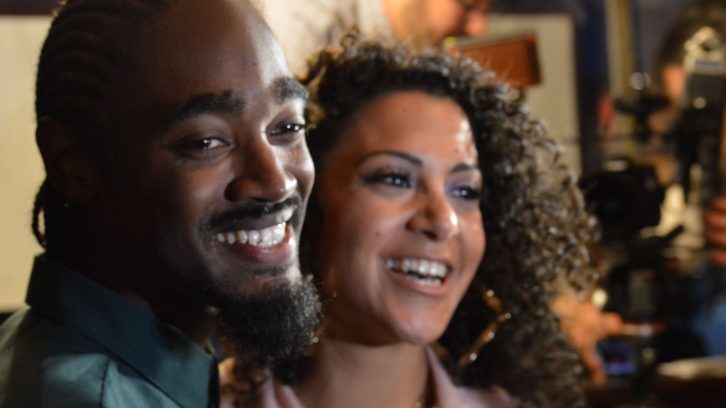
caption
Lindell Smith and girlfriend Verena Rizg pose for photos on election night.
Smith became the first African-Nova Scotian elected to council in 20 years, since amalgamation and the creation of the Halifax Regional Municipality (HRM). At the age of 26, he’s the second youngest councillor in the history of the HRM and city of Halifax.
Steps from Gottingen Street
For Smith, whose home has always been a “few steps” from Gottingen Street, becoming councillor is an accomplishment he never thought he’d achieve.
Smith grew up in Uniacke Square, an area that for much of the 1990s was stricken by gang violence and drugs. It’s a life Smith admits doesn’t lend itself to the making of a future politician.
“Most people, when I talk to them, tell me that they don’t understand how I made it to where I am now,” Smith said. “There were friends I knew, that to this day, were doing things that were negative. They were selling drugs or involved in crime or involved in gangs. I’ve lost some friends because of that life.”
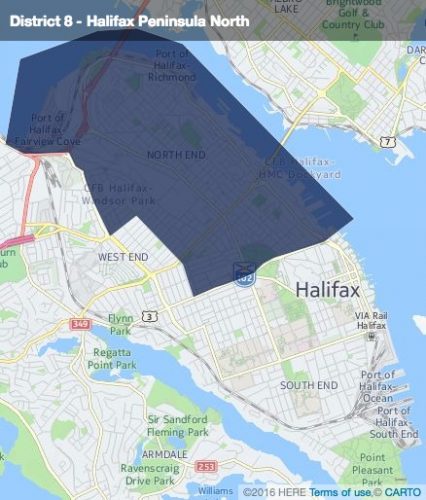
As a kid he went to school at St. Joseph’s-Alexander McKay Elementary, then later to St. Patrick’s Alexandra, St. Patrick’s High School and eventually Citadel High School. He also spent a lot of time at the Halifax North Memorial Library. He even got his first job there and eventually became the organization’s community outreach worker.
Recently, the area Smith knew as a child began changing – new condos, new businesses, new people – and he wondered if residents were benefiting from the gentrification around him.
Yet Smith never had an interest in politics. When former District 8 councillor Jennifer Watts announced she wouldn’t run for a third term, Smith got busy looking for a suitable replacement.
“We were running through a list in our heads of people that might fit the job description,” Smith said. “Eventually people started to just look at me and ask why I hadn’t considered putting my name out there.”
Once the suggestion was public, it didn’t take long for those around Smith to voice their support. By the time he announced his candidacy in April, the suggestion had became a goal.
Smith’s father, Lindsay Smith, never expected his son to have a career in politics.
“As a parent you’re proud of your kid no matter what he does,” he said. “But he (Lindell) knows what he’s doing; he’s focused and he’s a people person. He’ll do well.”
For Smith’s campaign manager, Jalana Lewis, taking the job was an easy decision.
“There was already a core group of volunteers in place when I arrived in the summer,” she said. “I like project management and I like managing people and while I never had experience in politics, I’ve dealt with projects that can get stressful. This seemed like a good group of people to work with.”
In the race
Halifax’s north end is an area in flux. New housing developments, shops and restaurants are popping up all over a district that has traditionally been blue collar, but not every part of the district has received the same level of attention. Smith, who has lived in Uniacke Square for his entire life, knows this better than most. It’s why a large part of his platform focused on community growth and consultation.
“When I was 12, I remember creating a DVD around all the things that needed to be fixed in the community,” Smith said. “We went around with this comical dinky camera and took video of all the rusted fences and broken playgrounds in Uniacke Square.”

caption
Smith pauses for a moment as he meets voters.
Watts was thinking of this as she was ending her last term as councillor of District 8.
“I looked at council and it seems we represent a community that is white, predominantly male and of an older generation,” she said. “I don’t think that reflects a reality for the people that live in this community.”
With Watts out of the race, Smith found himself facing a few challengers early on: Brenden Sommerhalder, the communications director of the Downtown Halifax Business Commission; Chris Poole, a community worker in the north end; and Anthony Kawalski, a British-born artist and photographer.
Three others came forward later: Patrick Murphy, a former councillor; Irvine Carvery, a former candidate for the Conservative Party in the 2015 federal election; and Martin Farrell; a Halifax resident whose family had lived in the area for five generations.
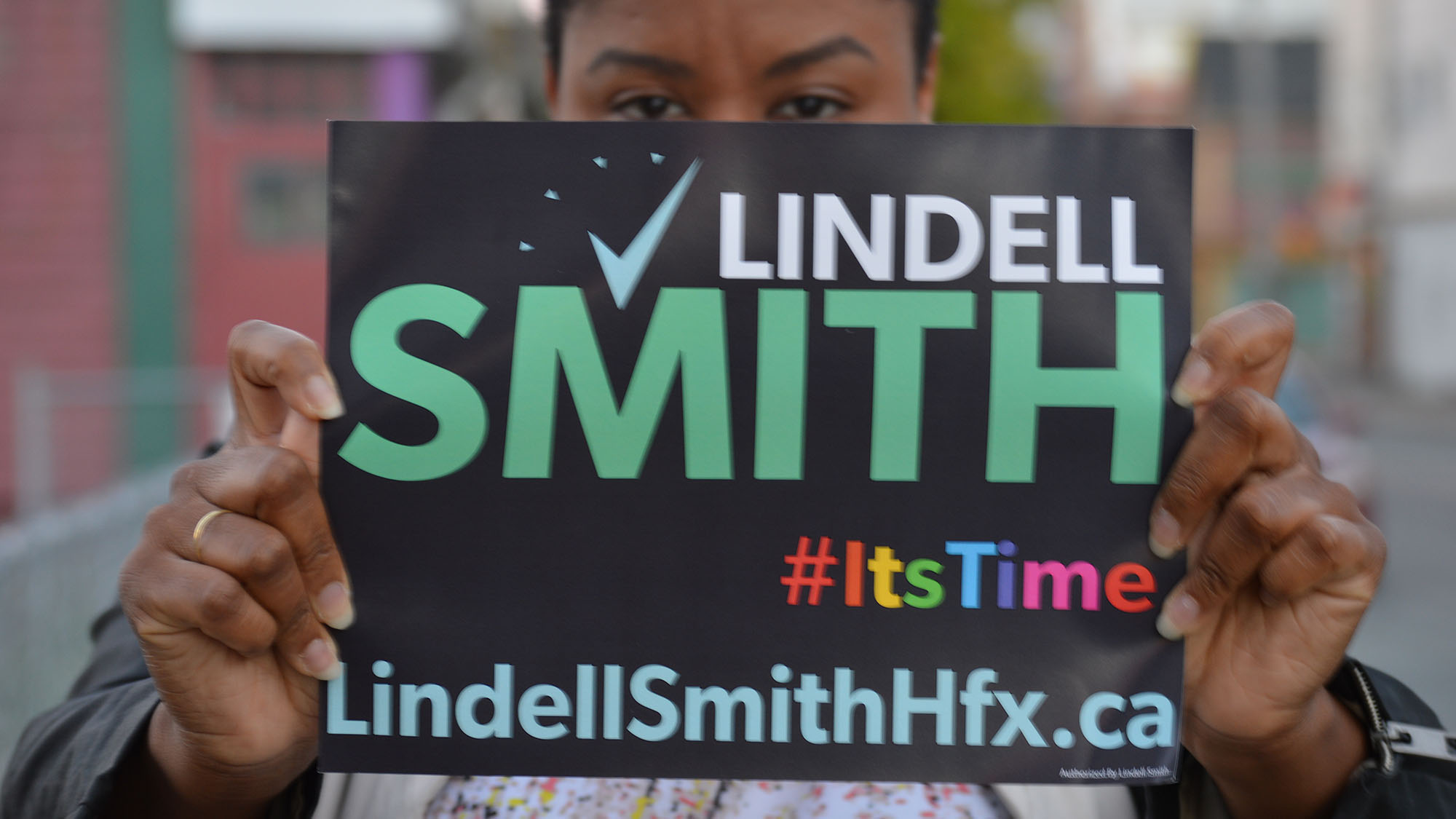
caption
Volunteer LaMeia Reddick with one of Smith’s many campaign signs.
Neither Smith, a political novice, nor Lewis as a first-time campaign manager had a problem with the long list of candidates.
Lewis, a graduate of Dalhousie University’s law program, decided that if this was the first political campaign she would run, then it might as well be the toughest.
As the election crept closer, Smith found it harder to juggle time between his personal life, his work and the campaign. He took an unpaid leave of absence from his work for the two months leading up to the Oct. 15 vote.
Smith financed his campaign through crowdfunding and donations, which he capped at $100 per person. He survived off limited savings, but the loss of a personal income hit him pretty hard.
“It’s been tight,” he said.
Hit the ground running
In Halifax, like most municipalities in Canada, municipal elections are non-partisan. Without the ability to rely on larger entities to fund a campaign, it’s up to a candidate to decide how much they are willing to spend. Without a party label, the candidate is essentially forced to sell themselves to the voter.
With only 20,790 African-Nova Scotians in the province, the community in Halifax is fairly small, but it’s a tight-knit community. Four years his senior, Lewis didn’t cross paths with Smith in school, but when she returned to Halifax in April she was already hearing good things about him. Knowing that Smith already had a campaign platform and a slogan, “#ItsTime,” made for an easy transition.
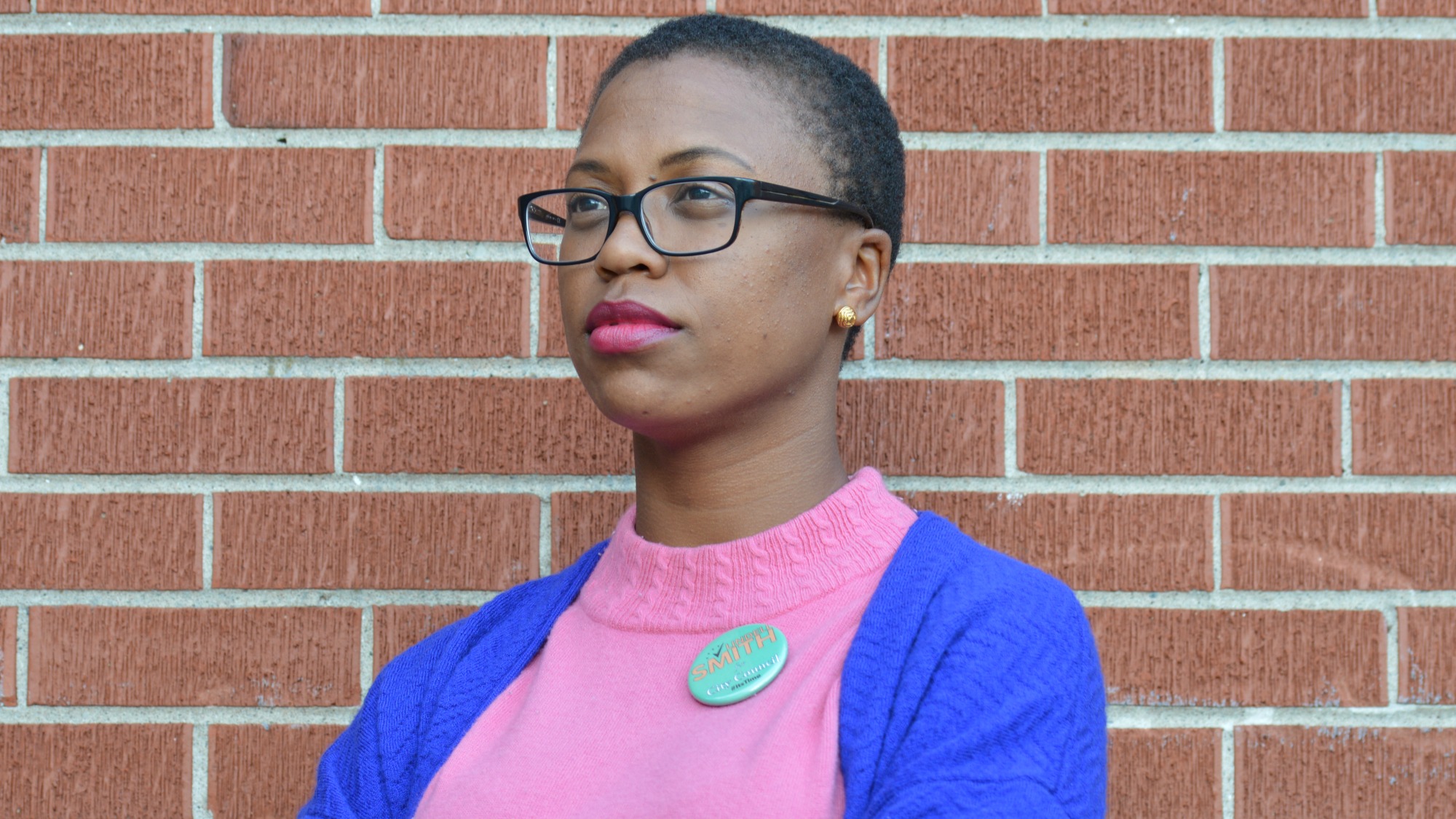
caption
Jalana Lewis is the architect behind Smith’s successful campaign.
Zachary Taylor, an expert in municipal elections at the University of Western Ontario, says every political campaign has two components: the air war, waged through advertisements on television and radio, and the ground war which relies on volunteers to go door to door and encourage people to vote.
“The air war is an expensive game to play, and as a result it’s very rarely used in a municipal election,” said Taylor. “If you think about Halifax, where each (district) has a large amount of houses, then the best recruitment tool you have is the ability to get your face in front of as many of them as possible.”
Lewis, having learned the lesson from conversations with experienced politicians like Mike Savage, the mayor of Halifax, put the ground war into play early.
Smith’s early announcement, combined with the support of about a dozen early volunteers, allowed them to get him in front of voters early and often.The hard work paid off. Signs promoting Smith sprouted up all over the north end of Halifax.
Less than a month before election day Smith received some of the best news a rookie political candidate can get. Within a week of each other he snagged a pair of high profile endorsements from former Halifax Needham MLA Maureen MacDonald and former Halifax MP Megan Leslie. Both knew him from his work in the community, and while he wasn’t expecting any endorsements, he was grateful.
“For Maureen to endorse me that gave me a wow kind of factor,” Smith said.
One day, he had the opportunity to go door knocking with the former MLA.
“Even the few streets we were able to hit up this morning, anyone who answered the door told her ‘Maureen, if you support this man then we do, too.’”
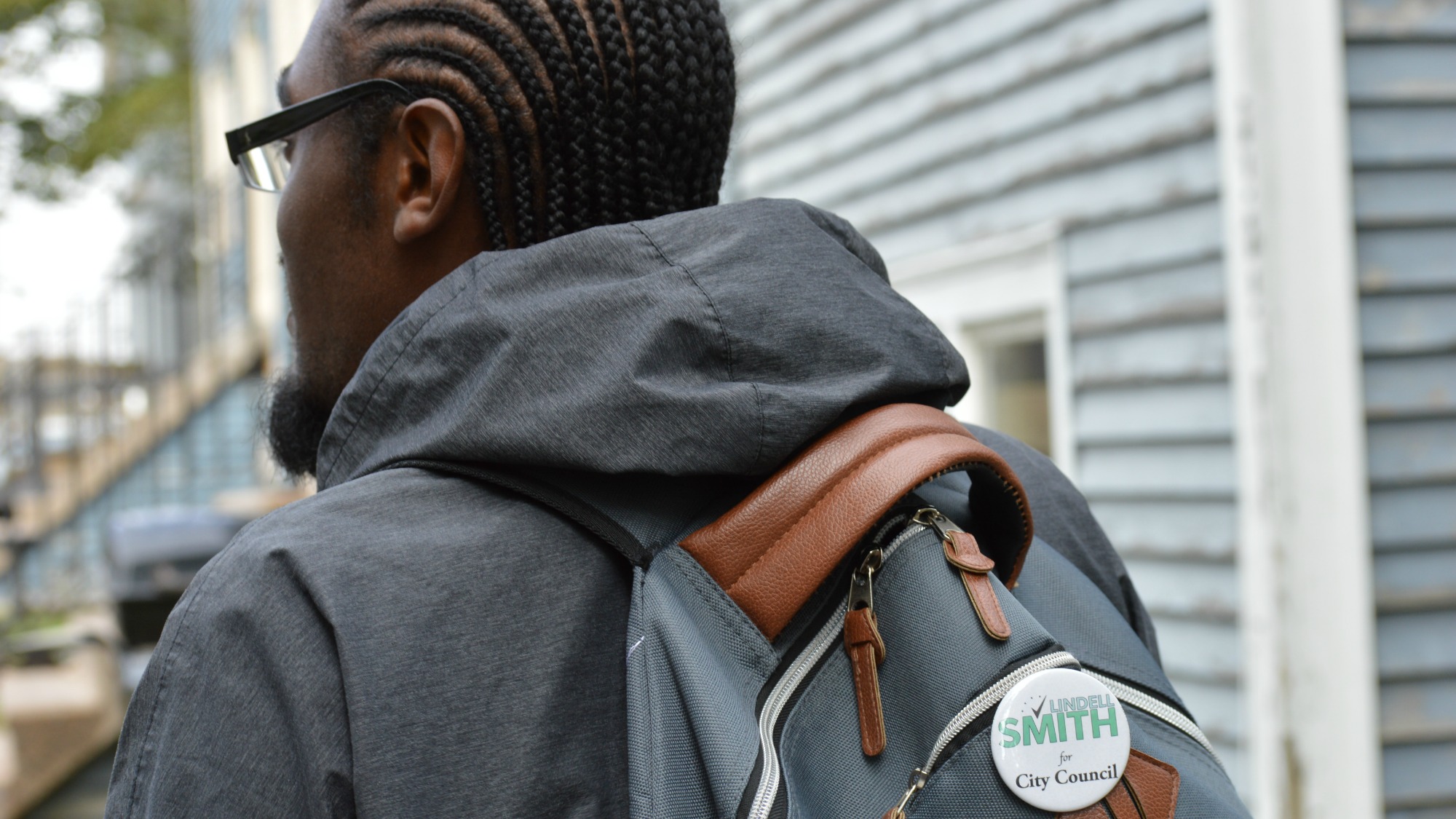
caption
Smith tries to visit every household in the district.
“There was one time where I went to a door and once the man found out I was running for council, he asked me to come in and tell his son that he should stop listening to gangster rap,” he said.
Smith’s campaign team had to remind him not everyone was going to be receptive to him.
“One of the core members had to tell me in the beginning that ‘People are going to judge you on how you look,’” Smith said. “It wasn’t to be condescending, it was just supposed to make me think.”
The vitriol that Smith received online was much worse than face-to-face. Posts on Facebook and Twitter would question his ability to lead a community that wasn’t African-Nova Scotian. The comment below was one example.
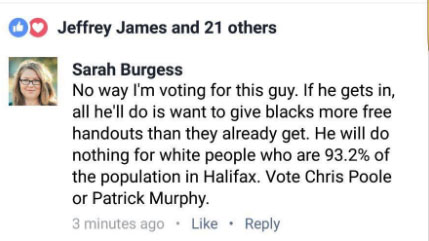
caption
One of the comments targeting Smith’s race as a reason not to vote for him.
“I care about working for the HRM, our city, our neighbourhood, our neighbours, our kids,” he said. He clutched the microphone in two hands as his voice quaked with anger.
“Diversity is important, but we need to break the cycle of what our city council looks like and how our city operates from top to bottom.”
Smith sat down in his seat to thunderous applause.
His biggest fan was outside in the hallway.
Jalana Lewis and Katherine Taylor, one of the campaign’s core volunteers, watched over Smith’s seven-year-old daughter, Jahtaya, who wasn’t interested at all in the debate. She found one of the only vending machines in the area and grabbed a cookies and cream bar.
“She’s her dad’s biggest fan,” said Taylor. “She bought that for her dad. She told me that since he’s doing such a good job at running for councillor he deserved a treat.”

caption
Smith’s daughter, Jahtaya, fights boredom by braiding a volunteer’s hair at a campaign event.
E-Day
Oct. 15, or E-day as it’s known within the campaign, plays out as if it’s scripted.
It’s an early day for everyone involved. With polls open for 11 hours, it is essential to get out the vote.
Lewis has organized the nearly 30 volunteers, with duties ranging from knocking on doors, driving voters to polls and serving as observers at polling stations. Observers are allowed to check who has voted, giving a rough estimate of how the campaign winds are blowing.
Smith’s headquarters operate out of the Leave Out the Violence office, just off of Gottingen Street. There is a steady stream of volunteers flooding in and out of the building. They span a diverse range of age groups, races and religions.
“He’s just so passionate about helping people,” says LaMeia Reddick, a campaign volunteer. She lives in another district and can’t even vote for Smith.
Smith’s girlfriend is at his side for support. Verena Rizg surprised him the night before. Having recently taken a job in Ontario it had seemed unlikely she would be able to fly back for election day, but campaign volunteers pitched in and sent her a ticket.
“I guess they just knew that he would need me to get through the day,” she says. She is sporting a customized pink button with ‘Team Lindor’ scrawled on it in black Sharpie. It’s the nickname that she’s called Smith since they started dating.
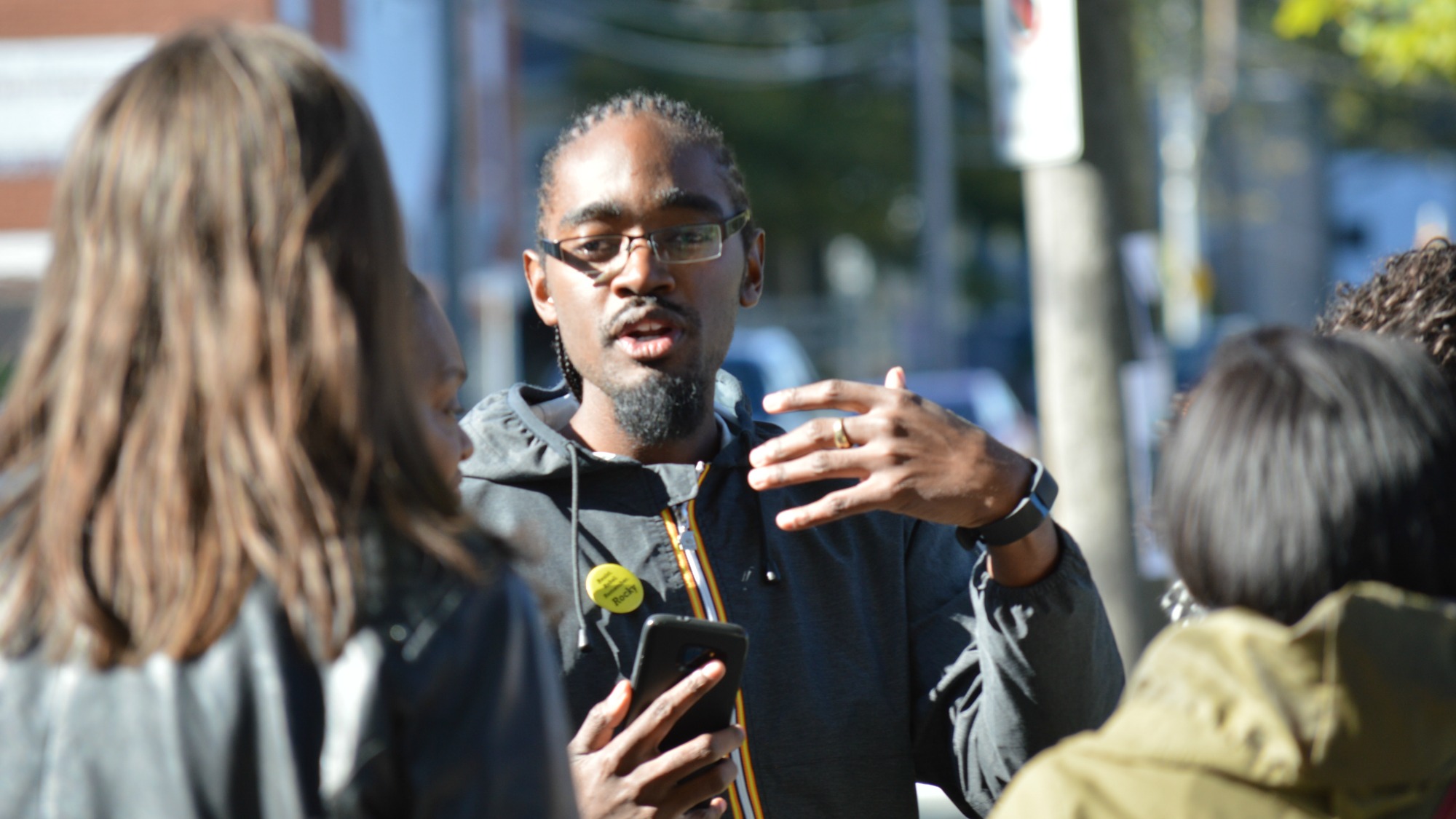
caption
Smith instructs his supporters on the march towards the polling station.
After voting, Rizg, Smith, and the couple’s friend Alvin Tynes, wander around Gottingen Street. Every few feet they stop, either to encourage a passerby to vote, or to chat with someone wishing Smith good luck.
Before the polls close, they make their way to Lion & Bright, a local bar, that had named a gimlet after Smith’s campaign slogan.
As the polls close, Rizg, Smith and Jahtaya change into formal clothes in the campaign’s already empty headquarters. Most supporters are already at Alteregos for the party. The trio pose for selfies and photos, making sure their clothes match with one another.
“My favourite part of this is that I get to dress him,” Rizg says, pointing to Smith’s emerald green shirt.
No one dares to think what will happen if Smith loses. He leaves with two speeches in his pocket, one for if he wins and another for if he loses.
They’re at Alteregos when the results come in.
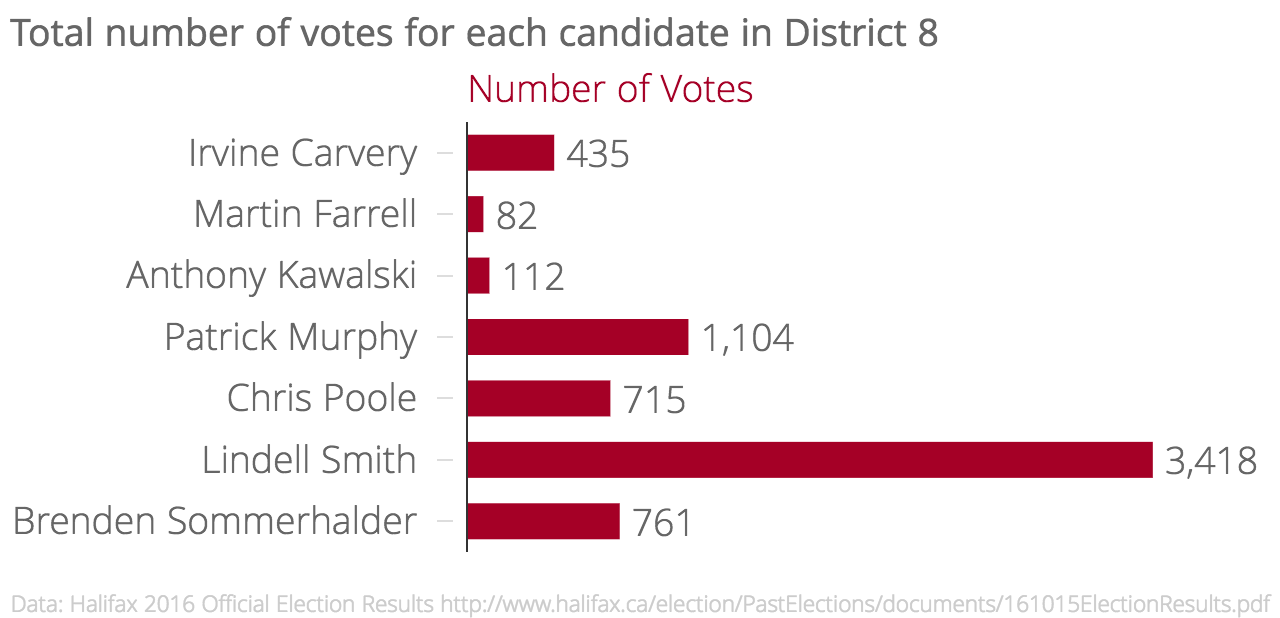
Smith doesn’t need his concession speech. Only Lewis and Smith know what was in it.
‘Make a difference’
For the 26-year-old, there is a lot to be done in the next four years.
Luckily, Smith has been given some advice by Robert Stapells, the man who holds the record for youngest councillor in Halifax. Stapells was only a few months younger when he was elected. The two men met while Smith campaigned door to door.
“You can do the same thing if you keep on working hard enough,” Stapells told Smith. “And trust me it’ll be hard, but it’s going to be rewarding and I believe you can do it too.”
Now, Smith’s focus is on his upcoming term. While he is familiar with the needs of the community, he says he’s still learning about council procedures.
“I hope that I’ll make a difference. People think that politicians are all bad people, but a politician isn’t a bad person,” Smith says.
“Sometimes politicians just become bad because they forget who they started running for.”

caption
Smith hears the results of the District 8 election.About the author
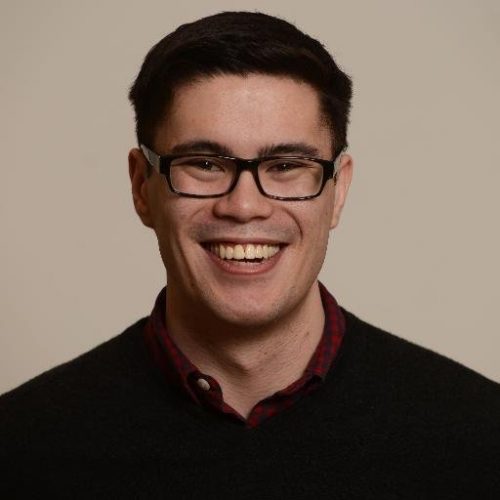
Alexander Quon
Alexander Quon is a freelance journalist from Saskatchewan with an interest in political reporting and data journalism. He's currently working...
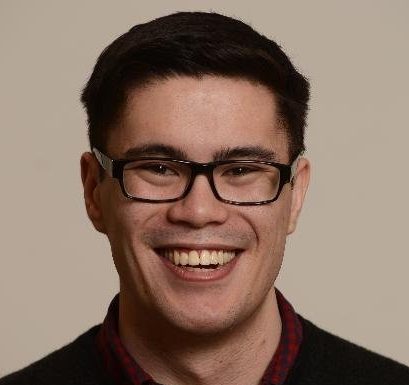

K
Karen
W
Wanda Lewis, and
E
Evelyn C. White
M
Michael Creagen1
c
carlotta